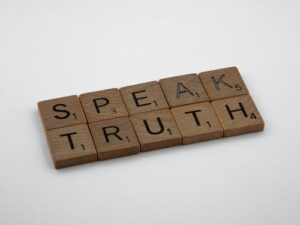Integrity and Honesty
Menanteau Serfontein – 15 January 2021. Updated 18 August 2021
Integrity
What is Integrity? Lots of people glibly speak about the importance of Integrity, but when they are asked what it means, one gets a wide variety of answers.
The definition of Integrity is the quality of being honest and having strong moral principles that one consistently lives by, i.e. steadfast adherence to a strict moral or ethical code.

A key part of Integrity is “doing what is right, even when no-one sees you” and is characterized by doing one’s duty, being upright, trustworthy, incorruptible, faithful and reliable.
Stephen R. Covey says that intrinsic personal security doesn’t come from what other people think of us or how they treat us. It doesn’t come from the scripts they’ve handed us. It doesn’t come from our circumstances or our position. It comes from within. It comes from accurate paradigms and correct principles deep down in our mind and heart. It comes from inside-out congruence, from living a life of integrity in which our daily habits reflect our deepest values. I agree with Covey who believes that “a life of integrity is the most fundamental source of personal worth. I do not agree with the popular success literature that says that self-esteem is primarily a matter of mindset, of attitude – that you can psych yourself into peace of mind.”
Is it important to act with Integrity at all times in all situations, i.e. to do what is right (even when no-one sees you), because it is the right thing to do (i.e. doing it for its own sake and not to get something in return).

The positive consequences and benefits of always doing the right thing, include living with a clear conscience and being regarded by others as steadfast, reliable, dependable, trustworthy and consistent resulting in people knowing what to expect from you in virtually all circumstances when it comes to doing the right thing.
“Whoever walks in integrity walks securely, but whoever takes crooked paths will be found out.” – Proverbs 10:9
Integrity should ideally be a core value of everyone. If integrity is missing, it often accompanies dishonesty and the lack of adherence to duty, dependability, faithfulness, reliability and trustworthiness. The consequences thereof include gaining a reputation for not always being truthful, people not trusting you, people never knowing what to expect, or taking wrong/inappropriate/unethical decisions and actions for the sake of expediency inconsistency instead of doing what is right based on moral principles, because it is the right thing to do.
Honesty (a sub-set of Integrity)
What is Honesty? Honesty means being truthful, sincere, dealing fairly, upright; free of deceit and free of fraudulence.
Honesty is to some extent a sub-set of Integrity. Honesty is the opposite of actions such as thieving, deceit and being fraudulent. Honesty results in one having a clear conscience, as the life of a genuinely honest person is characterized by a refusal to being involved in lying, dishonesty, theft, cheating, fraud, deception, spreading falsehoods (fake news), bribery or corruption, entitlement and bearing false witness.
Always tell the “full” truth. Sometimes one might be “truthful” to a certain degree, but by withholding relevant information about an issue which could put the reality/meaning of the matter in a different perspective, resulting in the “full” truth not being conveyed. If the full truth is conveyed, the complete picture is presented so that the person hearing or reading the “facts” would be provided with the opportunity to formulate an accurate view or opinion of the matter. When facts are twisted or if all the relevant information is not provided, then what is communicated is a lie.
Most people will know when they have been dishonest and realize that he/she is two-faced. In the case of most people, the realisation that they have been dishonest (particularly in extreme cases of gross dishonesty) could lead to debilitating tendencies such as worrying, anxiety, sleeplessness and getting into trouble. Covey says that peace of mind comes when your life is in harmony with true principles and values and in no other way.
Integrity and honesty without compromise should be key cornerstones of anyone’s values, principles and habits.  A life without being characterized by honesty and integrity at all times, results in distrust and people will tend to doubt your authenticity, reliability and dependability. Once the label of dishonesty has been attributed to someone, it becomes extremely difficult to extinguish that stigma amongst the people who have decided that the person is a dishonest liar.
A life without being characterized by honesty and integrity at all times, results in distrust and people will tend to doubt your authenticity, reliability and dependability. Once the label of dishonesty has been attributed to someone, it becomes extremely difficult to extinguish that stigma amongst the people who have decided that the person is a dishonest liar.
People who live a life of integrity and honesty possess a key building block necessary for enabling the enjoyment of peace of mind and inner fulfilment.
Theft/Stealing (a sub-set of Integrity)
What is Theft/Stealing? It means taking without permission something that does not belong to you.
Based on the Tao (refer C.S. Lewis), in virtually all societies throughout history, theft has been and is still regarded as wrong and anybody found guilty of theft is punished. Theft is clearly wrong under any circumstance. Our attitude should be to never take anything that does not belong to you even when no-one can see you, because it is the right thing to do to. The motivation should not be “I’d better not steal this, because if I get caught, I will go to jail”.
One can very easily get a reputation as a “thief” even if you have been found out only once for taking something that does not belong to you. In more serious instances, theft could lead to a criminal record and even a jail sentence.






